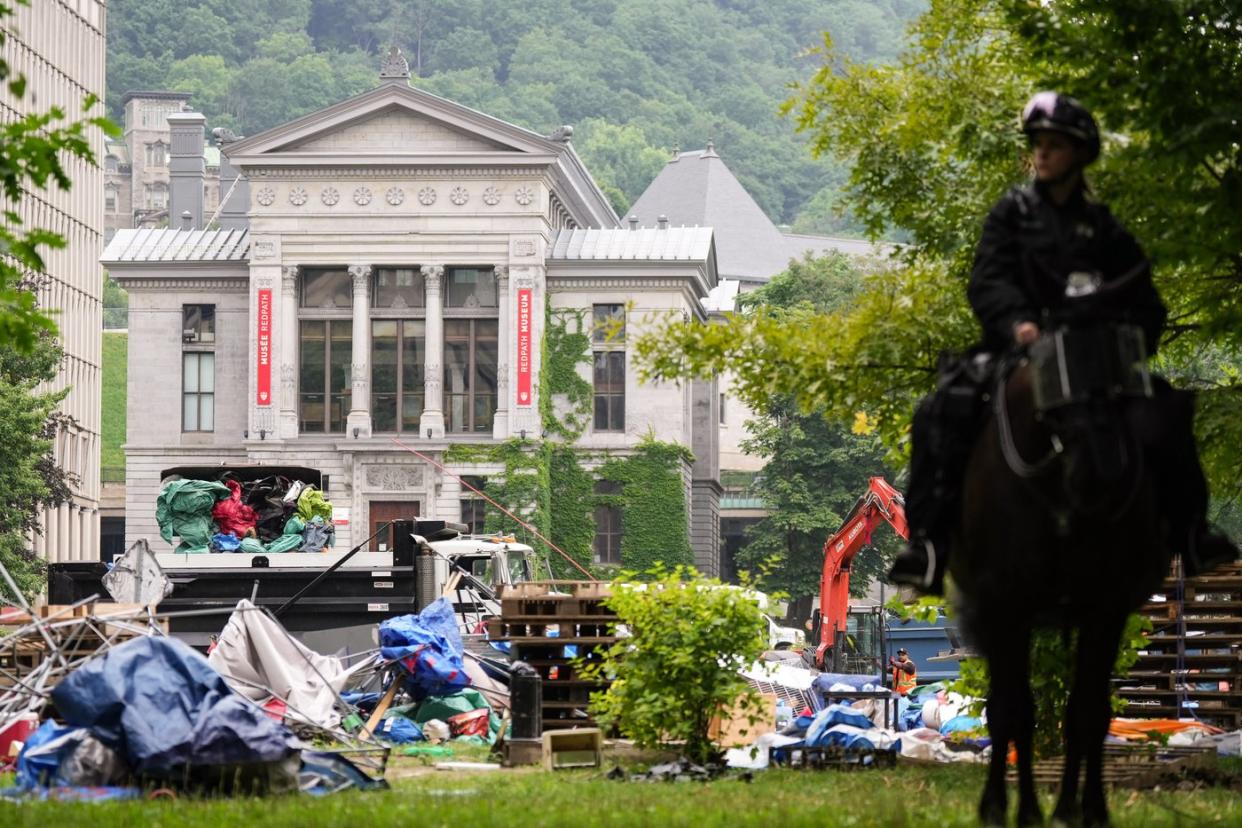With most campus pro-Palestinian encampments gone, protesters look to the future

MONTREAL — The protest encampment at McGill University was the first of its kind in the country, and its dismantling this week has left activists and observers wondering what comes next for the pro-Palestinian movement in Canada.
Protesters at McGill are promising to continue putting pressure on the university to end its investments connected to Israel’s military and cut ties with Israeli institutions in response to the war in the Gaza Strip.
“We will make McGill divest. We will make all complicit institutions divest,” said Eric Rogers, who said he was “forcibly removed” Wednesday from the lower field of McGill's downtown Montreal campus, on which dozens of tents had been set up since late April.
“Even if it is the end of the encampment, it's nowhere close to the end of the movement.”
But the removal of the McGill encampment follows a wave of closures of campus protest sites across the country, leaving questions about how activists will now make their voices heard.
“I suspect that it might be the end of encampments for now, but there will be other ways of trying to hold institutions to account,” said Ted Rutland, a professor at Concordia University who supported the McGill encampment. “There's no doubt the spirit here is very committed, and for good reason. This is the cause of our lifetime.”
On Thursday, pro-Palestinian groups at McGill and Concordia universities announced an evening demonstration at Phillips Square near the McGill campus. “The dismantlements will not stop us!” reads a poster advertising the event.
Rutland said he expects more direct action going forward. “Whether it's blocking highways, blocking ports, blocking railroads ... I think everyone understands that that's the kind of action we need right now.”
On Tuesday evening, hours before the encampment was removed, Montreal Mayor Valérie Plante was evacuated from a council meeting after it was disrupted by pro-Palestinian protesters.
McGill is one of several universities to see protests shut down in recent days. Last week, an Ontario judge granted an injunction against a two-month-old encampment at the University of Toronto. According to University of Ottawa law professor Michael Geist, that decision provided “a road map for other institutions” looking to dislodge their own campus protests.
In recent days, organizers of several Ontario encampments opted to clear out, including at the University of Waterloo, Western University, and the University of Ottawa. Encampments at universities in Guelph and Windsor are expected to come down in the coming days.
Memorial University in Newfoundland referenced the injunction to clear out a pro-Palestinian protest camp last week on its St. John's campus.
Protesters at the University of British Columbia in Vancouver ended their encampment over the weekend, saying they were leaving voluntarily.
There are still a few remaining campus protests, including at the University of Victoria in B.C. and at Dalhousie University in Halifax. “The idea that one can simply occupy space on a university campus for months on end, I think that's quite clearly over,” Geist said.
Now, he said, people are waiting “with bated breath to see what happens in September,” when students return to universities across the country. If they try to reoccupy campuses, he said, “I don't think there's much doubt that (universities) would take steps to try to bring those to an end quite quickly.”
Richard Robertson, director of research and advocacy at B'nai Brith Canada, said he hopes the era of encampments is over. “It's frustrating that it took this long … for universities across the country to really take action against the encampments,” he said. “It's my hope that institutions have learned a lesson from allowing these (protests) to become established, and that they would be more proactive in preventing them moving forward.”
The dismantling of the McGill protest did not follow directly from the University of Toronto injunction. Two Quebec Superior Court judges had previously rejected requests for injunctions against the encampment, and the university was seeking another.
In the interim, McGill said it hired a firm to investigate the encampment and found that most people sleeping there were unhoused, and that there were health and safety risks on the site, including drug use. The university then decided there was an “urgent” need to take down the camp.
Still, Rutland said the McGill encampment served a purpose, even if the students’ demands weren’t met. “I think that it planted the demand of divestment in the public mind,” he said. “And I think it provoked a debate about the ways in which we, without knowing it, end up supporting things that are contrary to our values.”
McGill has said it will explore divestment from weapons manufacturers.
In nine months of bombardment and offensives in Gaza, Israel has killed more than 38,200 people and wounded more than 88,000, according to the territory’s health ministry, which does not distinguish between combatants and civilians in its count.
During an Oct. 7 raid, Hamas militants killed 1,200 people in southern Israel, most of them civilians, according to Israeli authorities. The militants took roughly 250 people hostage. About 120 are still in captivity, with about a third said to be dead.
This report by The Canadian Press was first published July 11, 2024.
Maura Forrest, The Canadian Press


